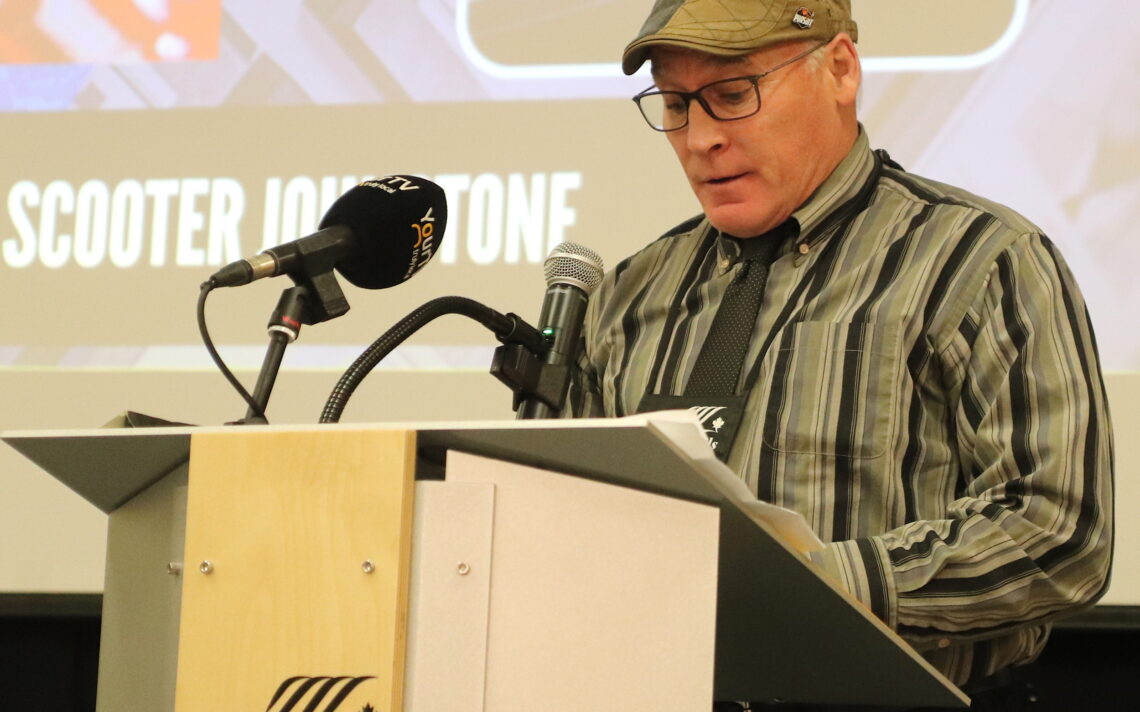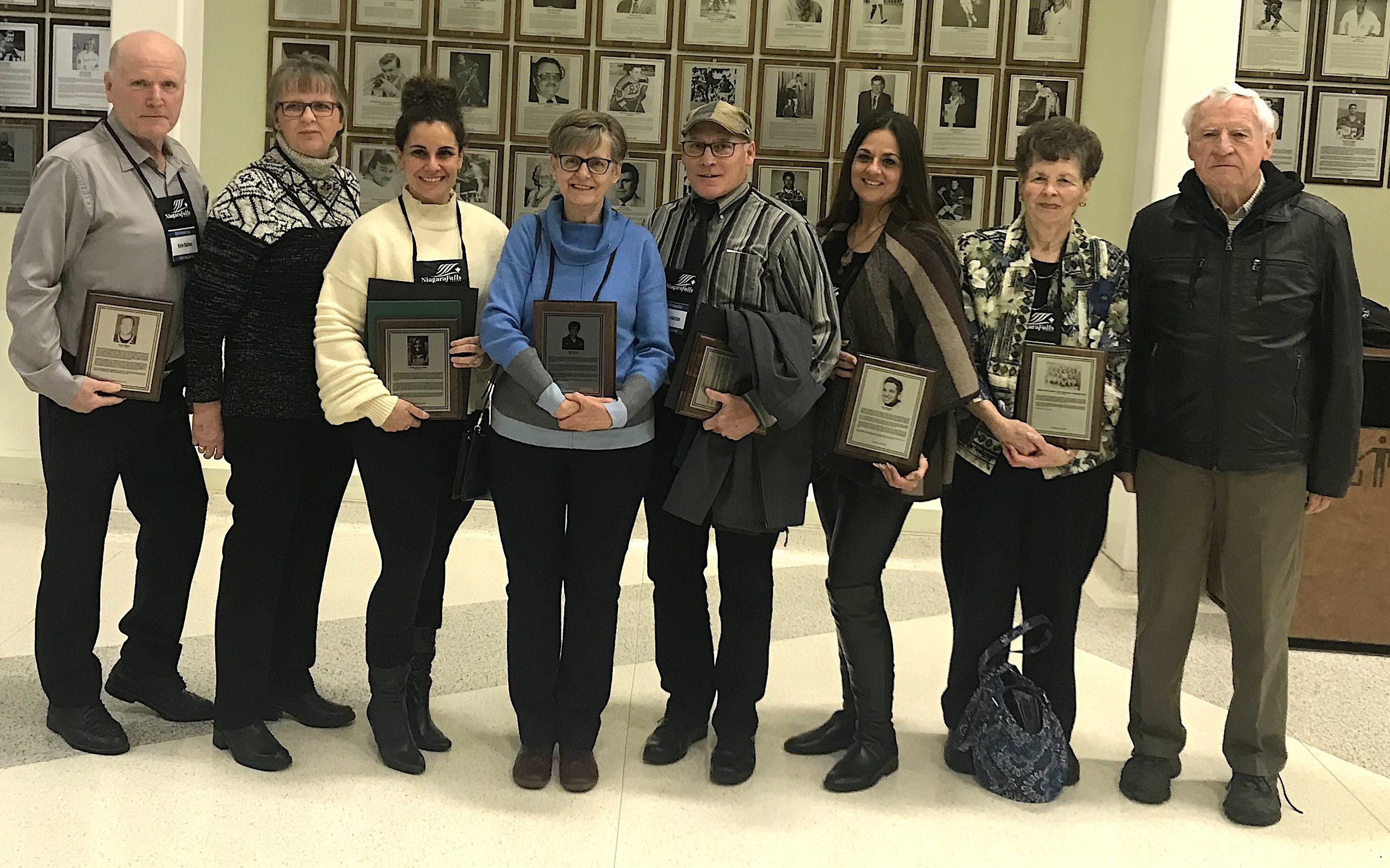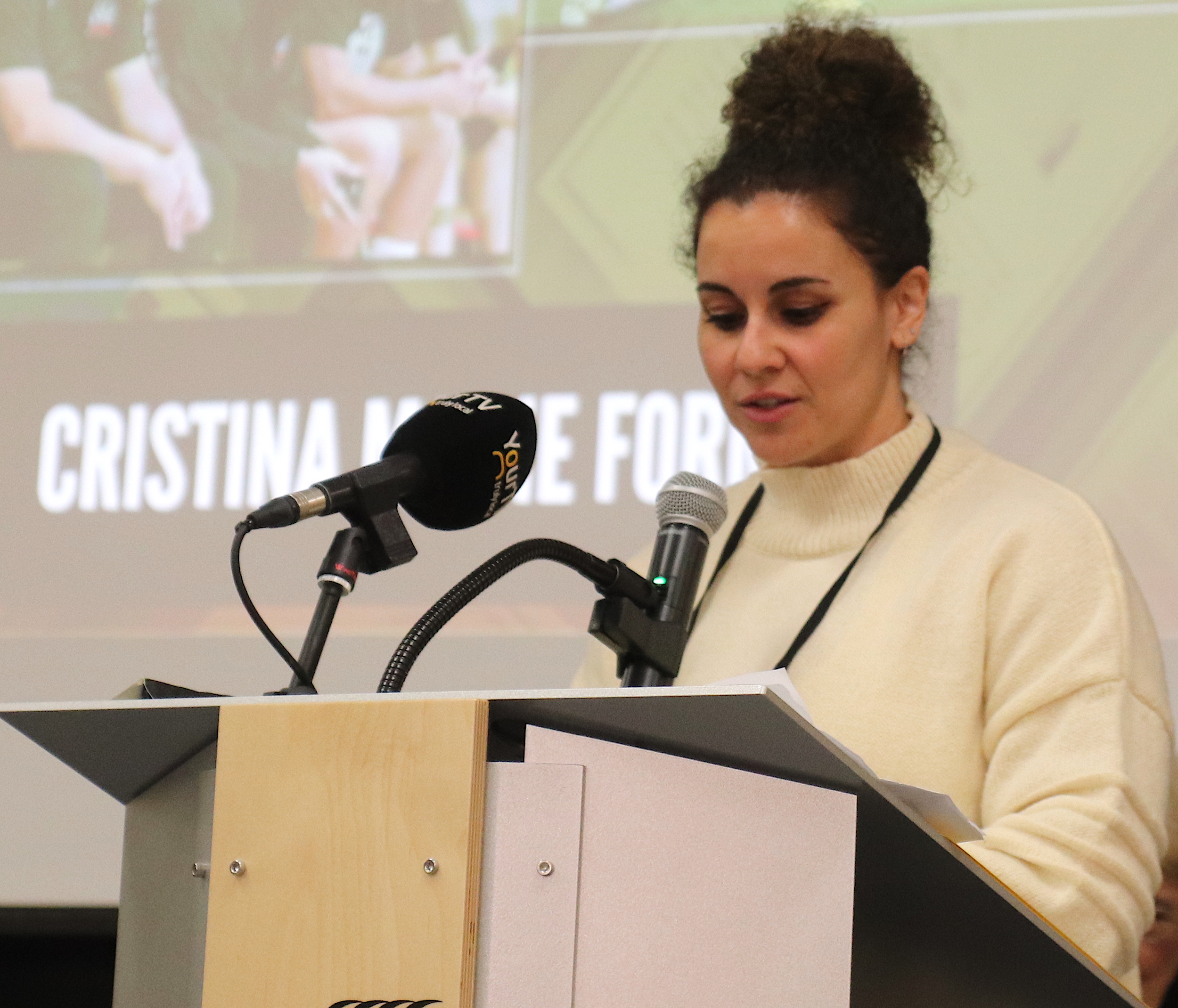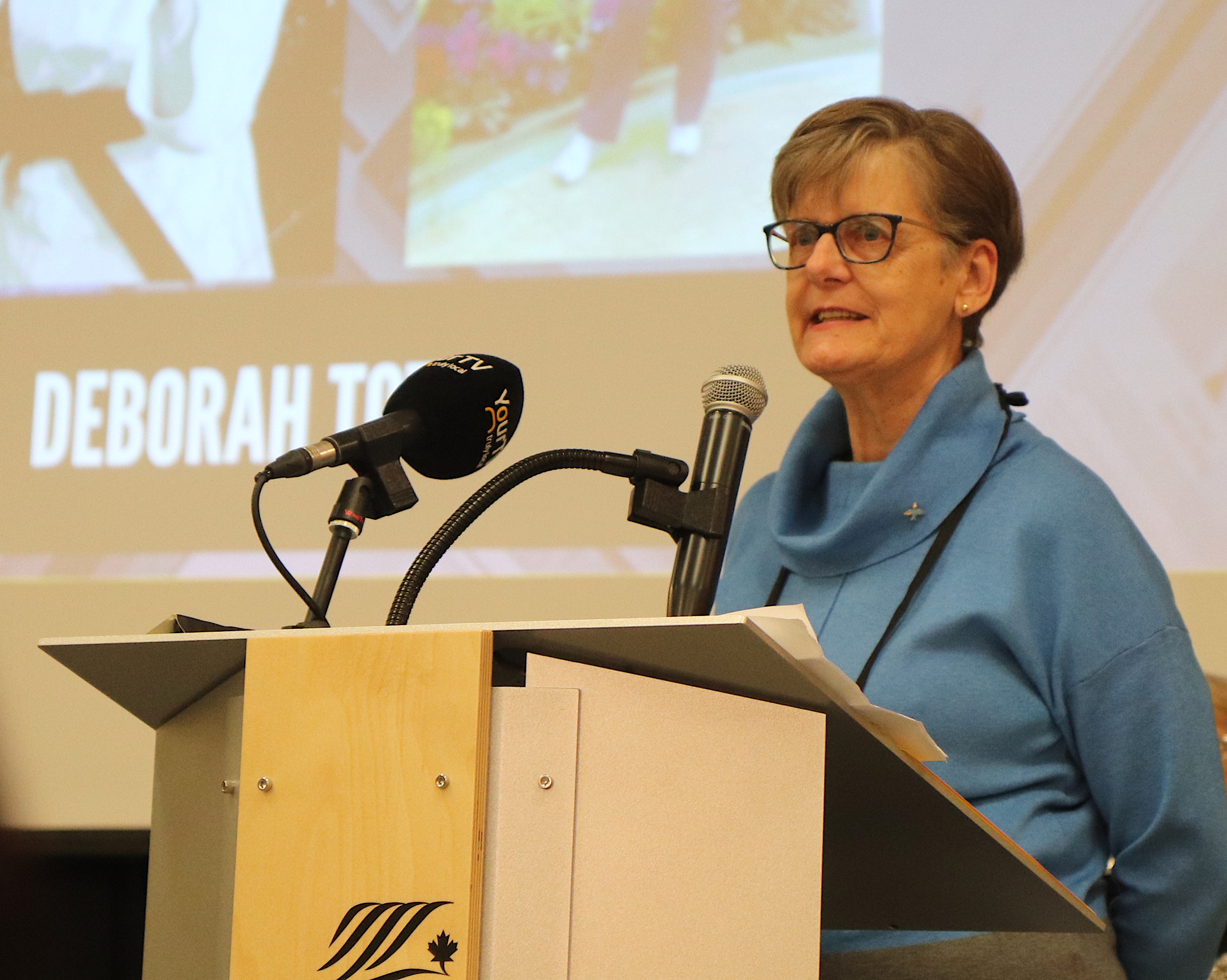
Johnstone born to coach: Niagara Falls 2022 sports wall of fame
A watershed moment in Chris Johnstone’s 35-year hockey coaching career came in the 1982-83 NCAA Division 2 semifinal game between the Niagara Falls native’s RIT squad and Lowell University.
The winner of the game would move on to play Joel Otto and Bemidji State in the finals. RIT was leading Lowell University, which hadn’t lost a Division 2 game in two years, 3-2 after two periods.
“Coach (Brian) Mason came in and it was nothing about do this or do that. He said, ‘You guys have a chance to do something today that will bond you guys and keep you together as teammates and friends for the rest of your lives.’ There was no ‘Rah, rah let’s go.’ Then he walked out of the room and it couldn’t have been a truer statement.”
Almost 40 years later, the statement still holds true for Johnstone, who guided the Chippawa River Hawks to an Ontario junior C championship in 2001, was a head coach in the OHL and coached almost every team in the Golden Horseshoe loop.
“I have been getting phone calls in the last week or so since the news of this has come out and everybody is reaching out,” Johnstone said. “We are so close. We were never the best team in the country but we were the best group of guys and we got it done at the right time.”
Mason’s message resonates to this day with Johnstone.
“As a coach now, I can still feel that speech and I tell all the players that I coach now that that is my mantra.”
Mason was a major influence in Johnstone’s coaching career as were minor and junior hockey coaches, Johnny Miller, Don Cipparone, Mike Miljus, Al Boone and Doug Jarrett.
All helped him develop his own coaching philosophy.
“Winning is hard and winning is a luxury and if you are always competing to win then you are in it for the wrong reasons,” said Johnstone, who coached one year at RIT before returning to Niagara. “You are in it with your players, to develop your players and give them the best experience they can have. In any given year that is important because if you don’t win, what do you have? Give them the best year they can have. It was an honour and a privilege to coach every player that I had and every player I will coach moving forward. They coach me up too and that is what it is all about.”
Coaching and hockey have been in the two-time All-American player’s blood forever.
“When I was playing minor hockey, my mom (Valerie) would drive my brother and I to the arena to coach atom house league teams. I was 15 and Greg was 16 and coaching was always a part of the whole thing.”
Johnstone’s parents were big part of his athletic career.
“She was an athlete herself and her father was very athletic and he loved sports. My dad was a gymnast born in Scotland and I don’t know where the hockey piece came from. With six kids, my parents kept us all busy and they dedicated everything to their kids.”
He pointed to his love and passion for coaching young men as the reason for his longevity.
“My love of the game is unwavering. I still do it and will continue to do it for as long as I am able. I just want to teach all these young athletes lessons in life so they can handle things,” he said, in his acceptance speech. “Life is tough, life is hard and anything I can teach them and anything they could learn though me and bring that with them forward so that they can handle the challenges in life, that’s why I do it.”
Johnstone thanked his family, especially his wife Cheryl, for their support.
“None of us do any of this without a great partner. It has been a long haul, I have been doing this a long time and she has been with me for every story along the way, some good, some not so good, but she would always rein me back in. She taught me the values in life, to appreciate kids and appreciate people.”
Other members of the 2022 induction class were Kevin Dallman, Felix (Gus) Mancuso, Deborah Toth, Cristina Marie Formica-Matesa and the Niagara Falls Anglicans women’s basketball team.
Dallman spoke at the induction by video.
“It’s a huge honour and I am so thankful,” the former NHL and KHL player said. “I want to thank my friend, Mike Strange, who did a lot for me training-wise and he was part of me being inducted into the sports wall of fame.”
He also credited his parents for taking him to games and getting him ready for everything.
“I can’t thank them enough, obviously. They are a huge part of my career and everything that I’ve done.
Most of all, he thanked his wife, Stacy, for sticking with him through his long career.
“My wife has been the rock who has held us together. She is going through some tough times but she will get through them. She is strong.”
Mancuso was the fourth athlete from Niagara Falls to play in the NHL. He played 42 games with the Montreal Canadiens and New York Rangers before going to fight overseas in the Second World War. When he returned from the war in 1945, he moved to California and played in the Pacific Coast League. He died in 2003 and was represented at the induction ceremony by his great niece, Michelle Rivait.
“On behalf of our family we would like to thank the committee first for selecting Uncle Gus as a 2022 inductee into the Niagara Falls Sports Wall of Fame,” she said. “We are honoured, as we know he would be, to be joining so many other proud athletes. We take pride in knowing for years to come, generations now and in the future will forever have a place and a memory to honour and reflect and to share the story of the legacy of Uncle Gus.”
Toth shared a story at the induction ceremony about turning down a head coaching position with Team Canada because she wanted to focus on her students in Niagara Falls.
“They were counting on me to be there day to day, every day. They are the people I served so I turned it down.”
She loved what her sport did for people, including a young girl who was being bullied at school.
“When they brought her to me, she couldn’t put her head up. She could only look down at the floor. She started karate and after awhile she not only put her head up because she became a very, spirited little girl.”
She told the induction audience the honour made her happy but one thing made her even happier.
“I am retired now but my school continues. The black belts that I trained are there leading the school now.”
Formica-Matesa described herself as being blessed for having a great athletic career and having it come full circle with her coaching career.
“It is a journey that is now providing me with so many opportunities to give back to my community and help pave the way for the next generation of athletes to perhaps one day find themselves where I am today, being recognized for all that they have accomplished as well,” the former Canadian Interuniversity Sport First-Team All-Canadian soccer player at Brock said. “Although I achieved a lot of great individual successes as an athlete none it would have been possible without an endless amount of support from the people around me.”
She thanked her family for its support and her former coaches for setting a great example.
“I am proud to say some of the strongest qualities I possess as a coach today came from those coaches and I strive to use their examples and pass that along to those that I coach today.”
She also thanked her high school students for trusting her to be their coach and guide them along their own journeys as athletes.
“Although I am honoured to be recognized for the individual successes as an athlete, what is most important to me is to be remembered as someone who left a lasting imprint on those around me,” she said. “If I have learned anything from my time as an athlete, it is about the bigger picture. At some point, everyone stops playing the game so what’s left over becomes the most important. If I can make a difference in the lives of the athletes, the students, my community and most importantly my daughter, then every individual success that I have achieved has been worth it.”

























